Adventures in RPGs: Long Arc or Short Arc?
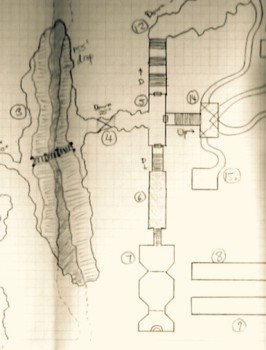 AD&D carried me from middle school right through college, and about seventy-five percent of the time, I wound up as the referee. The core group with whom I played continued right on getting together for another fifteen years or so after graduation, engaging in annual reunions all over the country.
AD&D carried me from middle school right through college, and about seventy-five percent of the time, I wound up as the referee. The core group with whom I played continued right on getting together for another fifteen years or so after graduation, engaging in annual reunions all over the country.
And I kept right on refereeing. After all, I had unfinished stories to “tell.” These story arcs played out over weeks, months, semesters, and then years. Many remain unfinished to this day. In the main, the rest of the group enjoyed my epic, often convoluted approach. For better or for worse, we weren’t much for hack-and-slash, in-and-out heroism.
Or were we? I’ll never forget Eric S. musing, as one reunion year wound down, that it sure would be nice if for once we could storm the castle, rescue the maiden, and be done.
His wistful comment stemmed in part from my having that very year posed a variant on that longed-for maiden-in-the-tower paternalistic standby: Orcus hired the party to rescue a damsel in distress, but this particular blushing violet turned out to be a truly enormous, deformed frog that had to be kissed in order to… well. Let’s just say there aren’t enough kisses in creation to make the wife of Orcus any more desirable.
Plus it took about forty hours of gaming to even find her, with lethal battles and tricky riddles littering the way.
Here’s the rub. What Eric S. was really getting at was the attraction of simplicity. The pleasure in avoiding gray areas and loose ends. The deep satisfaction that comes from a streamlined, manageable story line. Remember that short-lived ‘zine from a few years back, Bust Down the Door and Eat All the Chickens? They knew exactly what I’m getting at, although gaming might translate that title to, “Bust down the door, kill the orc guards, rescue whoever needs rescuing, and go home — probably to a cheering populace, a parade, and a debauched celebration banquet.”
It seems to me that a major factor in the success of a gaming group — perhaps the single most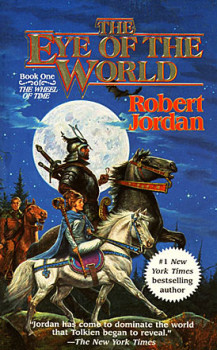 important factor, after basic compatibility — is striking the right balance between grand, complex long form story arcs and punchy, short form scenarios.
important factor, after basic compatibility — is striking the right balance between grand, complex long form story arcs and punchy, short form scenarios.
Consider: what do you want in your gaming life? “The Tower Of the Elephant,” over and done with in a few short pages, or The Wheel Of Time, where the narrative splays all over the cosmos and the word count (not to mention the body count) gets reckoned in the trillions?
Neither is wrong; both are valuable. But what’s the tenor of your group?
While working at Crown Books in Los Angeles (back at the dawn of time), two of my fellow clerks got wind of my predilection for D&D and asked me to ref a campaign for them. In the end, we met only once, for all of three hours. Apparently they’d expected to be nuking trolls inside of five minutes, like Kill Bill Part One. When that didn’t happen, they found something else to do — like, I don’t know, watch re-runs of Friends.
I was dismayed, of course — didn’t they know that character generation takes time? — but they weren’t wrong to want what they wanted. I was simply the wrong referee to provide it. I desired a story first. I wanted people inhabiting and enlarging their pencil and paper character sheets. I valued goals, and I wanted my players to be the ones to come up with those goals, to be proactive in their imaginary lives.
When they didn’t or couldn’t bring that energy, I was stymied. The story I’d hoped to send them toward had no way to develop, and our nascent troupe floundered.
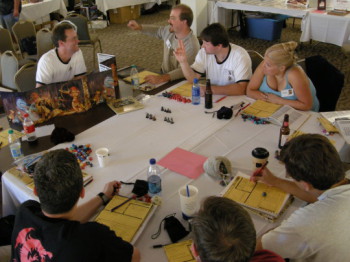 What I should have had ready was a violent and sudden backup scenario, something to spring on them if they started to yawn. Bandits, maybe. A troop of rabid baboons. Killer tape worms. Almost anything would have sufficed.
What I should have had ready was a violent and sudden backup scenario, something to spring on them if they started to yawn. Bandits, maybe. A troop of rabid baboons. Killer tape worms. Almost anything would have sufficed.
Myself, I lean toward longer arcs for two reasons. First, it’s my conviction that diffuse scenarios are more compelling as stories. I believe they’re richer, more redolent of real life (and I say this knowing full well that very often, we engage in RPGs as a way to escape “normal” life).
Second, role-playing games (D&D, etc.) trend toward digression and complication. The arcane rules contribute to this, certainly, but the real culprit is human psychology: players almost always find ways to do the unexpected, which not only delays any rush toward a neat, tidy conclusion, but often opens up entire new storylines — some of which cry out to be developed, returned to, explored. D&D sprawls because we sprawl our way through it. The job of the DM is and has always been to steer the characters’ ship toward the most interesting ports of call.
I recall one scenario, early in high school, that took all summer to complete — and we played a lot that year. Another, a collegiate adventure that involved tracking down a number of powerful artifacts that might (might!) make it possible to defeat the world’s largest dragon, required something on the order of two years with an average of over twelve hours of gaming per week.
I like to think I sprinkled shorter, more achievable scenarios into the larger matrix, but I can’t honestly be sure. Time muddies memory, especially mine.
So where do you stand on this spectrum of interest? Are you all in for the long-haul adventure, the kind that might be inconclusive, the type that tends to allow for morasses both temporal and moral, or are you the player that champs at the bit for clear, achievable goals and constant doses of roll-the-dice ultra-violence?
kind that might be inconclusive, the type that tends to allow for morasses both temporal and moral, or are you the player that champs at the bit for clear, achievable goals and constant doses of roll-the-dice ultra-violence?
Whatever your response, check back again in two weeks’ time. John O’Neill and I are cooking up a whole new Black Gate featurette, an actual original online dungeon module. Yes, that’s right: the map, the scenario, the key, you name it. An adventure you can run on your own, any ol’ time… and it’ll be FREE.
Like the sound of that?
I know I do.
But I’d better get to work. These ancient scrolls need translating, and the maps had better be re-copied ere they fall to dust and tatters…
Onward.
Mark Rigney has published three stories in the Black Gate Online Fiction library: ”The Trade,” “The Find,” and “The Keystone.” Tangent called the tales “Reminiscent of the old sword & sorcery classics… once I started reading, I couldn’t stop. I highly recommend the complete trilogy.” In other work, Rigney is the author of “The Skates,” and its haunted sequels, “Sleeping Bear,” and Check-Out Time. A new novel, Bonesy, will be released Sept. 1, 2015. His website is markrigney.net.
 |
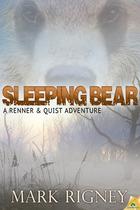 |
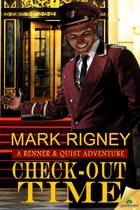 |
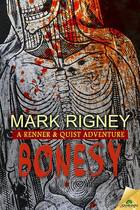 |
An online dungeon module. Count me intrigued.
First, I love the idea of you guys doing a module and i’m looking forward to it! This post really hits home with me.
My gaming groups have never met more than once a month and we played for around 5-7 hours each session. It was hard to get anything accomplished doing things the classic D&D way.
It took me a few bombed campaigns to figure out how to take the time we had and help meaningful events to happen during our limited game time.
The answer to this is run games in a more episodic style. I came up with an overall plot and had a general knowledge of the area that the game ways taking place and I set up the first part of the story and then the players took it from there. I knew that i wanted this story arc to come to a conclusion in around 7-10 of our game sessions.
The game ended in 8 sessions I was able to give that arc a conclusion that satisfied the players and now they had the option to start a new season and pick up where they left off, or start new characters.
It worked a lot better for us instead of trying to run the campaign that never ends until the whole part dies. And it really helped that the players and I (as the GM) got a sense that we completed a game.
Unless you already have an established group which you know plays both regularly and frequently over a long time, trying long story arcs is usually rather nonsensical. The odds of a game that is slowly meandering around growing into a regular thing with highly engaged players are rather slim.
I always advise to new GMs to start both simple and with fast and immediate payoff for everyone. Being in the dark for four or five sessions without knowing what’s going on and what the meaning of it all is just isn’t that fun. Maybe fun enough to keep playing when you’re at the table, but not so fun that you will clear a time slot in your schedule.
Too many GMs want to run big epic stories that run for years, go halfway around the world and beyond, with characters who become the greatest heroes starting from nothing. But that’s writing a novel series. In a big novel series it can be rewarding if everything suddenly makes sense in book 8. But the characters in a game are the players characters. The players are not playing the game to assist the GM in playing out his story. In a novel the reader often sees tbe story from different perspectives, often knowing what the villain is doing while the heroes do not. You can’t just make a novel story into a campaign.
Instead, a good adventure is one that is not about the big story but all about the characters experiences. The players always have to know what their goal is and what their current activities are hopefully accomplishing. That’s very difficult to do in a long arc, but really not that hard in a serial campaign. Make the adventures connected through a common location or group of enemies, but make each adventure have its own wrapped up conclusion every two or three sessions.
Planning campaigns should be more like making TV shows, not novel trilogies.
Bob: Good!
Glenn: Yep. Balance is key. Glad you and your group found it.
Martin: Yes. Established groups vs. one-off groups require very different things. But I do think that players and GMs work together to unfold a story. RPGs function like very expansive improv work in theater, in which everyone is responsible for pushing things along, and that’s true no matter if the arcs are long, short, or medium rare.
Thanks, all, for weighing in!
I used to prefer running campaigns with long arcs, divided mostly into bite-sized adventures. But I don’t think it’s worked as well recently. I used to pride myself on the fact that my campaigns almost never petered out, and that they came to a proper conclusion. I think in the last eight years those that concluded are in the minority. Maybe it’s because all of us adults are busy, or maybe it’s because we’ve kind of seen it all when we’ve been gaming as long as we have. Honestly, apart from some games for the kids, I kind of got burned out.
Now I’m more into episodic adventures, at least in theory. Continuing cast, like old style tv shows, but not some huge plot arc.
I have to admit that the other idea that appeals to me is a true sandbox campaign, which I’ve never really run. There are some great sandbox generation tools these days that I didn’t have when I was first game mastering, and I’d like to try them out on a group. Here’s a link with links to a number of my favorites: http://www.howardandrewjones.com/games/jungle-adventure
Oh, I can say that as much as I love a long dungeon crawl in theory, I find myself bored with running a dungeon if it goes on for very long, and most of my players do as well.
Babylon 5. Short adventures that also build on the larger arc.
As I’ve probably said here before, my sweet spot in gaming is when the group has worked through their big adventures, earned their reputations, wealth, and status, and then gone their separate ways. While everyone was dealing with their own lives and goals, the big arcs of the world continued moving forward and sometimes demanded attention. Thereafter gaming sessions involved one player as often as two or three. Four-plus were the big once-a-year sessions when a player or two who had moved away were visiting. (Funny how often the big arcs demanded attention at just that moment.)